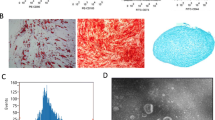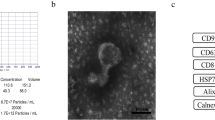Abstract
Background
Disruption of intestinal barrier function and an imbalance in intestinal immunity are crucial for the occurrence and development of ulcerative colitis. Because of their important roles in regulating inflammation and immunity, exosomes (Exos) released from bone marrow mesenchymal stem cells (BMSCs) may be useful for treating ulcerative colitis. The EphB/EphrinB signaling pathway plays a crucial role in the inflammatory process and the development and function of immune cells, and can mediate long-distance intercellular communication through extracellular vesicles. This study was conducted to explore the effects of pre-modified BMSC-Exos expressing EphB2 (EphB2-Exos) on immunoregulation in vitro.
Methods
We transfected a lentivirus vector encoding EphB2 into BMSCs and isolated EphB2-Exos from the culture supernatant. Inflammation and oxidative damage in the human colon adenocarcinoma cell line (Caco-2) were induced by dextran sulfate sodium/hydrogen peroxide. In addition, spleen CD4+ T lymphocytes of rats were sorted in vitro. We conducted a series of experiments to explore the biological functions of EphB2-Exos.
Results
EphB2-Exos were successfully isolated and were found to significantly protect the activity, proliferation, and migration of Caco-2 cells that were inhibited by dextran sulfate sodium. EphB2-Exos alleviated inflammation and apoptosis and increased the activity of antioxidant enzymes while inhibiting oxidative stress in Caco-2 cells. EphB2-Exos restored intestinal barrier function by inhibiting the RhoA/ROCK pathway and regulated the polarization of CD4+T cells.
Conclusion
EphB2-Exos enhanced intestinal barrier function and regulated the immune balance by inhibiting the RhoA/ROCK pathway in vitro. These findings suggest that EphB2-Exos can be applied as a cell-free therapy for ulcerative colitis.








Similar content being viewed by others
References
Barquilla A, Pasquale EB (2015) Eph receptors and ephrins: therapeutic opportunities. Annu Rev Pharmacol Toxicol 55:465–487. https://doi.org/10.1146/annurev-pharmtox-011112-140226
Batlle E, Henderson JT, Beghtel H, van den Born MM, Sancho E, Huls G, Meeldijk J, Robertson J, van de Wetering M, Pawson T et al (2002) Beta-catenin and TCF mediate cell positioning in the intestinal epithelium by controlling the expression of EphB/ephrinB. Cell 111:251–263. https://doi.org/10.1016/s0092-8674(02)01015-2
Bros M, Haas K, Moll L, Grabbe S (2019) RhoA as a key regulator of innate and adaptive immunity. Cells. https://doi.org/10.3390/cells8070733
Carrero R, Cerrada I, Lledó E, Dopazo J, García-García F, Rubio MP, Trigueros C, Dorronsoro A, Ruiz-Sauri A, Montero JA et al (2012) IL1β induces mesenchymal stem cells migration and leucocyte chemotaxis through NF-κB. Stem Cell Rev Rep 8:905–916. https://doi.org/10.1007/s12015-012-9364-9
Charrier L, Yan Y, Driss A, Laboisse CL, Sitaraman SV, Merlin D (2005) ADAM-15 inhibits wound healing in human intestinal epithelial cell monolayers. Am J Physiol Gastrointest Liver Physiol 288:G346-353. https://doi.org/10.1152/ajpgi.00262.2004
Chen W, Huang Y, Han J, Yu L, Li Y, Lu Z, Li H, Liu Z, Shi C, Duan F et al (2016) Immunomodulatory effects of mesenchymal stromal cells-derived exosome. Immunol Res 64:831–840. https://doi.org/10.1007/s12026-016-8798-6
Cho HJ, Hwang YS, Yoon J, Lee M, Lee HG, Daar IO (2018) EphrinB1 promotes cancer cell migration and invasion through the interaction with RhoGDI1. Oncogene 37:861–872. https://doi.org/10.1038/onc.2017.386
Fan H, Zhao G, Liu L, Liu F, Gong W, Liu X, Yang L, Wang J, Hou Y (2012) Pre-treatment with IL-1β enhances the efficacy of MSC transplantation in DSS-induced colitis. Cell Mol Immunol 9:473–481. https://doi.org/10.1038/cmi.2012.40
François M, Romieu-Mourez R, Li M, Galipeau J (2012) Human MSC suppression correlates with cytokine induction of indoleamine 2,3-dioxygenase and bystander M2 macrophage differentiation. Mol Ther 20:187–195. https://doi.org/10.1038/mt.2011.189
Geremia A, Biancheri P, Allan P, Corazza GR, Di Sabatino A (2014) Innate and adaptive immunity in inflammatory bowel disease. Autoimmun Rev 13:3–10. https://doi.org/10.1016/j.autrev.2013.06.004
González MA, Gonzalez-Rey E, Rico L, Büscher D, Delgado M (2009) Adipose-derived mesenchymal stem cells alleviate experimental colitis by inhibiting inflammatory and autoimmune responses. Gastroenterology 136:978–989. https://doi.org/10.1053/j.gastro.2008.11.041
Gyorgy B, Hung ME, Breakefield XO, Leonard JN (2015) Therapeutic applications of extracellular vesicles: clinical promise and open questions. Annu Rev Pharmacol Toxicol 55:439–464. https://doi.org/10.1146/annurev-pharmtox-010814-124630
Hafner C, Meyer S, Hagen I, Becker B, Roesch A, Landthaler M, Vogt T (2005) Ephrin-B reverse signaling induces expression of wound healing associated genes in IEC-6 intestinal epithelial cells. World J Gastroenterol 11:4511–4518. https://doi.org/10.3748/wjg.v11.i29.4511
Harrell CR, Jovicic N, Djonov V, Arsenijevic N, Volarevic V (2019) Mesenchymal stem cell-derived exosomes and other extracellular vesicles as new remedies in the therapy of inflammatory diseases. Cells. https://doi.org/10.3390/cells8121605
Himanen JP, Saha N, Nikolov DB (2007) Cell-cell signaling via Eph receptors and ephrins. Curr Opin Cell Biol 19:534–542. https://doi.org/10.1016/j.ceb.2007.08.004
Hofstetter CP, Schwarz EJ, Hess D, Widenfalk J, El Manira A, Prockop DJ, Olson L (2002) Marrow stromal cells form guiding strands in the injured spinal cord and promote recovery. Proc Natl Acad Sci U S A 99:2199–2204. https://doi.org/10.1073/pnas.042678299
Hu C, Li L (2018) Preconditioning influences mesenchymal stem cell properties in vitro and in vivo. J Cell Mol Med 22:1428–1442. https://doi.org/10.1111/jcmm.13492
Hu L, Wang H, Huang L, Zhao Y, Wang J (2016) The protective roles of ROS-mediated mitophagy on (125)I seeds radiation induced cell death in HCT116 cells. Oxid Med Cell Longev 2016:9460462. https://doi.org/10.1155/2016/9460462
Jacinto A, Martinez-Arias A, Martin P (2001) Mechanisms of epithelial fusion and repair. Nat Cell Biol 3:E117-123. https://doi.org/10.1038/35074643
Jin Y, Blikslager AT (2020) The regulation of intestinal mucosal barrier by myosin light chain kinase/Rho kinases. Int J Mol Sci. https://doi.org/10.3390/ijms21103550
Jurewicz M, Yang S, Augello A, Godwin JG, Moore RF, Azzi J, Fiorina P, Atkinson M, Sayegh MH, Abdi R (2010) Congenic mesenchymal stem cell therapy reverses hyperglycemia in experimental type 1 diabetes. Diabetes 59:3139–3147. https://doi.org/10.2337/db10-0542
Kalani A, Tyagi A, Tyagi N (2014) Exosomes: mediators of neurodegeneration, neuroprotection and therapeutics. Mol Neurobiol 49:590–600. https://doi.org/10.1007/s12035-013-8544-1
Kaser A, Zeissig S, Blumberg RS (2010) Inflammatory bowel disease. Annu Rev Immunol 28:573–621. https://doi.org/10.1146/annurev-immunol-030409-101225
Katz KD, Hollander D, Vadheim CM, McElree C, Delahunty T, Dadufalza VD, Krugliak P, Rotter JI (1989) Intestinal permeability in patients with Crohn’s disease and their healthy relatives. Gastroenterology 97:927–931. https://doi.org/10.1016/0016-5085(89)91499-6
Kawano H, Katayama Y, Minagawa K, Shimoyama M, Henkemeyer M, Matsui T (2012) A novel feedback mechanism by Ephrin-B1/B2 in T-cell activation involves a concentration-dependent switch from costimulation to inhibition. Eur J Immunol 42:1562–1572. https://doi.org/10.1002/eji.201142175
Kullander K, Klein R (2002) Mechanisms and functions of Eph and ephrin signalling. Nat Rev Mol Cell Biol 3:475–486. https://doi.org/10.1038/nrm856
Lisabeth EM, Falivelli G, Pasquale EB (2013) Eph receptor signaling and ephrins. Cold Spring Harb Perspect Biol. https://doi.org/10.1101/cshperspect.a009159
Liu H, Dasgupta S, Fu Y, Bailey B, Roy C, Lightcap E, Faustin B (2019) Subsets of mononuclear phagocytes are enriched in the inflamed colons of patients with IBD. BMC Immunol 20:42. https://doi.org/10.1186/s12865-019-0322-z
May GR, Sutherland LR, Meddings JB (1993) Is small intestinal permeability really increased in relatives of patients with Crohn’s disease? Gastroenterology 104:1627–1632. https://doi.org/10.1016/0016-5085(93)90638-s
Mehandru S, Colombel JF (2021) The intestinal barrier, an arbitrator turned provocateur in IBD. Nat Rev Gastroenterol Hepatol 18:83–84. https://doi.org/10.1038/s41575-020-00399-w
Nguyen TM, Arthur A, Hayball JD, Gronthos S (2013) EphB and Ephrin-B interactions mediate human mesenchymal stem cell suppression of activated T-cells. Stem Cells Dev 22:2751–2764. https://doi.org/10.1089/scd.2012.0676
Ning K, Yang B, Chen M, Man G, Liu S, Wang DE, Xu H (2022) Functional heterogeneity of bone marrow mesenchymal stem cell subpopulations in physiology and pathology. Int J Mol Sci. https://doi.org/10.3390/ijms231911928
Odenwald MA, Turner JR (2017) The intestinal epithelial barrier: a therapeutic target? Nat Rev Gastroenterol Hepatol 14:9–21. https://doi.org/10.1038/nrgastro.2016.169
Pando A, Schorl C, Fast LD, Reagan JL (2023) Tumor derived extracellular vesicles modulate gene expression in T cells. Gene 850:146920. https://doi.org/10.1016/j.gene.2022.146920
Pasquale EB (2008) Eph-ephrin bidirectional signaling in physiology and disease. Cell 133:38–52. https://doi.org/10.1016/j.cell.2008.03.011
Pasquale EB (2010) Eph receptors and ephrins in cancer: bidirectional signalling and beyond. Nat Rev Cancer 10:165–180. https://doi.org/10.1038/nrc2806
Renna S, Cottone M, Orlando A (2014) Optimization of the treatment with immunosuppressants and biologics in inflammatory bowel disease. World J Gastroenterol 20:9675–9690. https://doi.org/10.3748/wjg.v20.i29.9675
Rovedatti L, Kudo T, Biancheri P, Sarra M, Knowles CH, Rampton DS, Corazza GR, Monteleone G, Di Sabatino A, Macdonald TT (2009) Differential regulation of interleukin 17 and interferon gamma production in inflammatory bowel disease. Gut 58:1629–1636. https://doi.org/10.1136/gut.2009.182170
Shen Q, Huang Z, Yao J, Jin Y (2022) Extracellular vesicles-mediated interaction within intestinal microenvironment in inflammatory bowel disease. J Adv Res 37:221–233. https://doi.org/10.1016/j.jare.2021.07.002
Sultana H, Neelakanta G (2023) Isolation of exosomes or extracellular vesicles from West Nile virus-infected N2a cells, primary cortical neurons, and brain tissues. Methods Mol Biol 2585:79–95. https://doi.org/10.1007/978-1-0716-2760-0_9
Sun D, Zhuang X, Xiang X, Liu Y, Zhang S, Liu C, Barnes S, Grizzle W, Miller D, Zhang HG (2010) A novel nanoparticle drug delivery system: the anti-inflammatory activity of curcumin is enhanced when encapsulated in exosomes. Mol Ther 18:1606–1614. https://doi.org/10.1038/mt.2010.105
Tindemans I, Joosse ME, Samsom JN (2020) Dissecting the heterogeneity in T-Cell mediated inflammation in IBD. Cells. https://doi.org/10.3390/cells9010110
Vancamelbeke M, Vermeire S (2017) The intestinal barrier: a fundamental role in health and disease. Expert Rev Gastroenterol Hepatol 11:821–834. https://doi.org/10.1080/17474124.2017.1343143
Wang Y, Wang X, Yang W, Zhao X, Zhang R (2018) Effect of Simvastatin on the intestinal Rho/ROCK Signaling pathway in rats with sepsis. J Surg Res 232:531–538. https://doi.org/10.1016/j.jss.2018.07.016
Wilson AJ, Gibson PR (1997) Epithelial migration in the colon: filling in the gaps. Clin Sci 93:97–108. https://doi.org/10.1042/cs0930097
Wu J, Luo H (2005) Recent advances on T-cell regulation by receptor tyrosine kinases. Curr Opin Hematol 12:292–297. https://doi.org/10.1097/01.moh.0000166497.26397.9f
Xu R, Zhang F, Chai R, Zhou W, Hu M, Liu B, Chen X, Liu M, Xu Q, Liu N et al (2019) Exosomes derived from pro-inflammatory bone marrow-derived mesenchymal stem cells reduce inflammation and myocardial injury via mediating macrophage polarization. J Cell Mol Med 23:7617–7631. https://doi.org/10.1111/jcmm.14635
Xu B, Chen Y, Peng M, Zheng JH, Zuo C (2023) Exploring the potential of exosomes in diagnosis and drug delivery for pancreatic ductal adenocarcinoma. Int J Cancer 152:110–122. https://doi.org/10.1002/ijc.34195
Yoseph BP, Klingensmith NJ, Liang Z, Breed ER, Burd EM, Mittal R, Dominguez JA, Petrie B, Ford ML, Coopersmith CM (2016) Mechanisms of intestinal barrier dysfunction in sepsis. Shock 46:52–59. https://doi.org/10.1097/SHK.0000000000000565
Yu T, Chu S, Liu X, Li J, Chen Q, Xu M, Wu H, Li M, Dong Y, Zhu F et al (2021) Extracellular vesicles derived from EphB2-overexpressing bone marrow mesenchymal stem cells ameliorate DSS-induced colitis by modulating immune balance. Stem Cell Res Ther 12:181. https://doi.org/10.1186/s13287-021-02232-w
Zhang H, Wang L, Li C, Yu Y, Yi Y, Wang J, Chen D (2019) Exosome-induced regulation in inflammatory bowel disease. Front Immunol 10:1464. https://doi.org/10.3389/fimmu.2019.01464
Zhang L, Jiao G, Ren S, Zhang X, Li C, Wu W, Wang H, Liu H, Zhou H, Chen Y (2020) Exosomes from bone marrow mesenchymal stem cells enhance fracture healing through the promotion of osteogenesis and angiogenesis in a rat model of nonunion. Stem Cell Res Ther 11:38. https://doi.org/10.1186/s13287-020-1562-9
Zhao H, Sun X, Tong J (2020) Role of ROCK/NFkappaB/AQP8 signaling in ethanolinduced intestinal epithelial barrier dysfunction. Mol Med Rep 22:2253–2262. https://doi.org/10.3892/mmr.2020.11318
Acknowledgements
The authors thank Dr Chengcheng Yin for helpful discussion.
Funding
This study was supported by the National Natural Science Foundation of China (81774093).
Author information
Authors and Affiliations
Contributions
SC and HF conceived and designed the study. SC, TY, WW, HW, FZ, CW, FG and CL performed the experiments. SC, TY and HF analyzed the data. SC, TY, and WW wrote the manuscript. All authors read and approved the final manuscript.
Corresponding author
Ethics declarations
Conflict of interest
None.
Additional information
Publisher's Note
Springer Nature remains neutral with regard to jurisdictional claims in published maps and institutional affiliations.
Rights and permissions
Springer Nature or its licensor (e.g. a society or other partner) holds exclusive rights to this article under a publishing agreement with the author(s) or other rightsholder(s); author self-archiving of the accepted manuscript version of this article is solely governed by the terms of such publishing agreement and applicable law.
About this article
Cite this article
Chu, S., Yu, T., Wang, W. et al. Exosomes derived from EphB2-overexpressing bone marrow mesenchymal stem cells regulate immune balance and repair barrier function. Biotechnol Lett 45, 601–617 (2023). https://doi.org/10.1007/s10529-023-03358-y
Received:
Revised:
Accepted:
Published:
Issue Date:
DOI: https://doi.org/10.1007/s10529-023-03358-y




